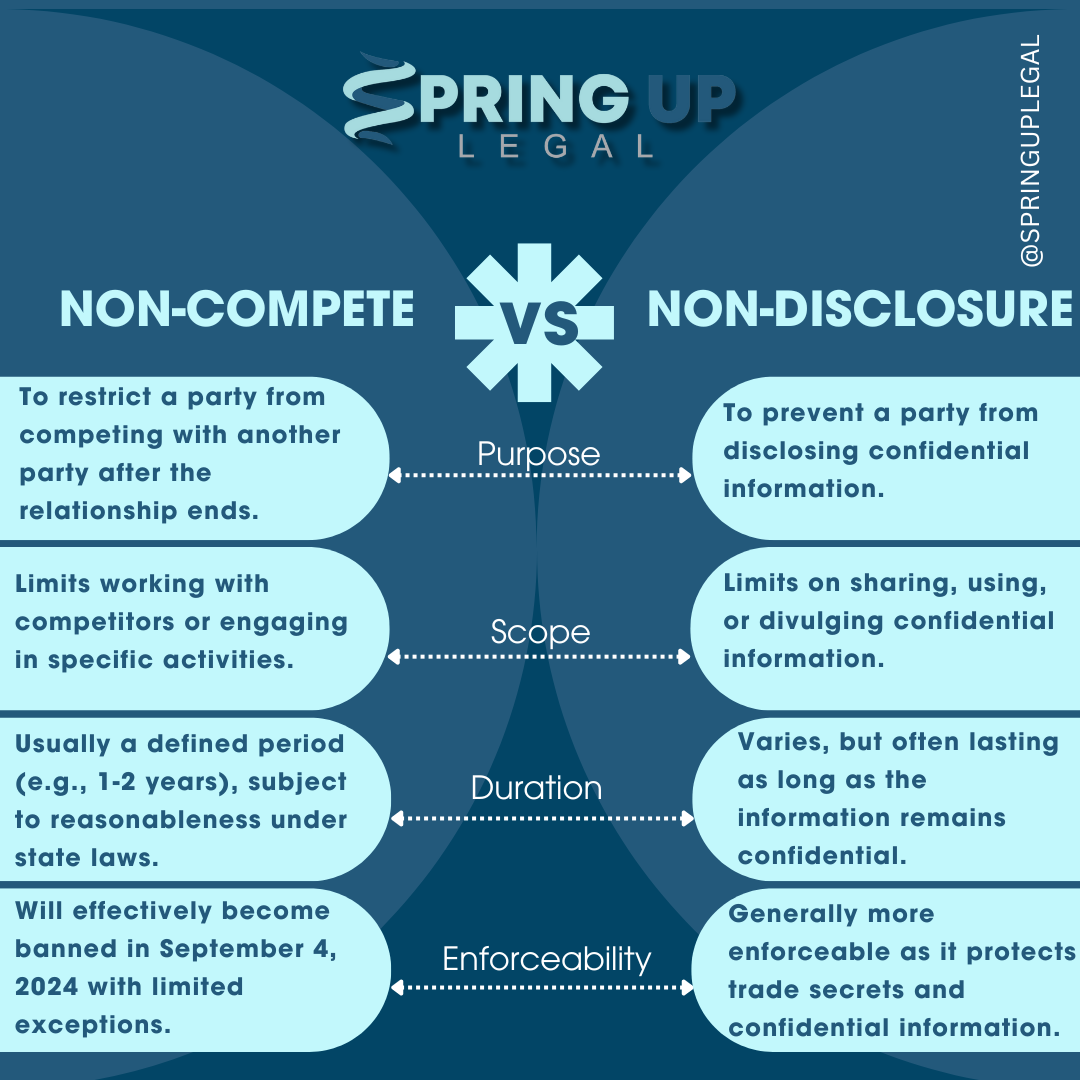Business Restrictions: Differentiating Non-Compete Agreements and Non-Disclosure Agreements
In today's super fast-paced business environment, protecting sensitive information and safeguarding competitive edges are extremely critical for entrepreneurs and businesses alike. Non-compete agreements (NCAs) and non-disclosure agreements (NDAs) serve as vital tools in this regard, yet they often stir controversy. Let’s briefly jump into these agreements, exploring their roles, distinctions, similarities, and the recent legislative changes affecting them.
Overview
Non-compete agreements (NCAs) and non-disclosure agreements (NDAs) are legal contracts designed to protect businesses' interests. In general, a business will have their employees sign an NCA in order to restrict their employees from working with competitors or starting a competing business for a specified period and within a particular geographic area after leaving a company. Non-competes can also be in the form of a clause within an Employment Contract; however, for the purposes of this post, we’ll refer to both as “NCA”. Shifting gears to NDAs, a business will have individuals and/or entities, with whom it is disclosing certain information, to sign an NDA in order to prevent those individuals and entities from disclosing confidential information learned during their employment and/or business relationship.
These agreements are pivotal in safeguarding trade secrets, proprietary information, and maintaining a competitive advantage. However, they are also controversial, often criticized for restricting the mobility and innovation of employees and business partners. As the entrepreneurial landscape evolves, understanding these agreements' intricacies and recent changes in legislation is crucial for business owners, regardless of your industry.
What is a Non-Compete Agreement?
A Non-Compete Agreement is a contract between an employer and an employee, wherein the employee agrees not to enter into competition with the employer for a specified period after their employment period ends. Key elements of an NCA include:
Duration: Specifies how long the non-compete agreement/clause will be in effect after employment ends.
Location: Defines the specific area within which the employee cannot compete.
Scope of Work: Details the type of employment or business activities restricted.
The main purpose of NCAs is to protect businesses from losing key employees to competitors and prevent the dissemination of sensitive business information. However, the enforceability of the NCAs varies by jurisdiction, with courts often scrutinizing their reasonableness concerning duration, geographic scope, and the employee's role.
What is a Non-Disclosure Agreement?
A Non-Disclosure Agreement is a legal contract that prohibits parties from disclosing confidential information shared during their business relationship. Usually, a party will want the other party to sign an NDA in order to protect its trade secrets, business strategies, client lists, and other proprietary information. Key features of an NDA include:
Definition of Confidential Information: Clearly identifies what information is considered confidential.
Obligations of Receiving Party: Specifies the receiving party’s responsibilities in maintaining confidentiality.
Duration: States how long the confidentiality obligation lasts, often beyond the termination of the business relationship.
In general, NDAs provide legal recourse if a “disclosing party’s” confidential information is improperly disclosed by the “receiving party”, thus offering peace of mind to disclosing party sharing sensitive data with employees, contractors, or business partners.
What’s the Difference?
While both NCAs and NDAs serve to protect a business’ interests, they do so in distinct ways:
Purpose: NCAs prevent competition, while NDAs prevent the disclosure of confidential information.
Scope: NCAs restrict future employment opportunities, whereas NDAs restrict the sharing of certain information.
Duration: NCAs typically last for a specified period after employment ends, while NDAs can extend indefinitely regarding the confidentiality of certain information.
These differences reflect the unique ways each agreement seeks to protect a company's interests.
How Are they Similar?
Despite their differences, NCAs and NDAs share several similarities:
Protective Nature: Both agreements aim to safeguard a company’s competitive edge and sensitive information.
Contractual Basis: Both are legal contracts requiring mutual consent and consideration.
Legal Recourse: Both provide a basis for legal action if the terms are violated, thus serving as deterrents against breaches.
These similarities underscore their roles as essential tools in a company's legal arsenal to protect its assets.
Recent Updates to Non-Competes
The landscape of non-compete agreements is shifting in the United States, with increasing scrutiny and legislative changes aimed at limiting their use. Historically, several states, including California, North Dakota, and Oklahoma, have long banned NCAs. Recently, the Federal Trade Commission (FTC) has proposed a rule to ban non-compete clauses nationwide, arguing they stifle competition and innovation. Businesses are required to comply with this new regulation by the September 4, 2024 deadline, necessitating a review and adjustment of existing employment agreements to ensure they align with the forthcoming legal standards.
These proposed changes are part of a broader trend toward enhancing employee mobility and fostering a more dynamic labor market. Businesses must stay informed about these developments and be prepared to adjust their employment agreements accordingly.
Conclusion
For entrepreneurs navigating the complexities of non-compete and non-disclosure agreements, staying informed and proactive is essential. As legislative landscapes evolve, businesses must review and potentially update their contracts to ensure compliance and protect their interests. Consulting with a knowledgeable business law firm can provide the guidance needed to navigate these changes effectively.
By understanding and appropriately utilizing NCAs and NDAs, entrepreneurs can safeguard their business assets while fostering a fair and competitive work environment. Adjusting business strategies in light of new regulations will be crucial for maintaining a competitive edge in an ever-changing market.
If you’re entrepreneur or creative and need assistance with drafting a comprehensive NDA tailored to your needs, feel free to contact us for a consultation.



